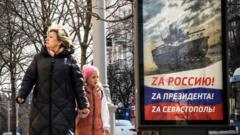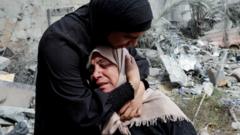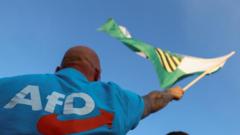A glimpse into life under Russian occupation in Ukraine reveals a culture of fear, as Ukrainians resist erasure of their identity while grappling with brutal repression.*
Rising Fear and Suppression: Life Under Russian Occupation in Ukraine

Rising Fear and Suppression: Life Under Russian Occupation in Ukraine
In occupied areas of Ukraine, the suppression of Ukrainian identity extends to language, traditions, and holidays, as locals face strict repression.
Amid the ongoing war, the plight of individuals living in Russian-occupied Ukraine is growing increasingly dire, reflecting the deep scars of conflict. One anonymous voice, Maria, reveals how Russians are not only targeting Ukrainian cultural expressions, such as holiday celebrations and language, but also inflicting a reign of terror on dissenters. Living in a constant atmosphere of fear, Maria embodies the struggle of many as they navigate life under intense scrutiny.
As the U.S. pushes for a peace deal, Ukrainians under occupation confront the harsh realities of suppression. The Kremlin has imposed stringent measures to extinguish Ukrainian identity, instilling severe penalties for anyone expressing dissent. While Ukrainian officials resist conceding any territory to Russia, Moscow's determined ambitions over the partially held regions — Donetsk, Luhansk, Kherson, and Zaporizhzhia — remain a significant concern, adding to the pervasive fear among residents.
Communicating with family still in occupied regions has become perilous, with many fearing surveillance and punishment by Russian authorities. Sofia, a Ukrainian now residing in the UK, recounts chilling experiences of her parents, who faced accusations from the FSB for alleged contacts with the Ukrainian military. The ongoing repression makes even basic necessities elusive for those refusing Russian citizenship, underscoring the impact of occupation on day-to-day life.
The atmosphere of suspicion amidst the occupation stifles communication, prompting individuals to withhold contact for fear of exposing their loved ones to retaliatory measures. Many fear indiscriminate punishment for speaking out, with reports of imprisonment and disappearing activists seeping in from human rights organizations.
Among the resistance, underground groups have emerged, risking everything to defy repression. Groups like Zla Mavka focus on non-violent resistance through the dissemination of information and symbols of Ukrainian identity, despite the looming threat posed by Russian authorities, who intensify surveillance to quash dissent.
Propaganda permeates everyday life, with notable attempts to reshape the identity of occupied regions through a barrage of pro-Russian messaging plastered across cities, educational establishments, and media. As Ukrainians navigate these oppressive conditions, both silence and resilience emerge as a hallmark of their struggle, with the reality of life under occupation starkly captured in the whispered fears of individuals like Maria.
As the war continues to wreak havoc, the stories of courage and resistance in occupied Ukraine serve as a poignant reminder of the human cost of conflict and an unwavering spirit for identity and freedom.
As the U.S. pushes for a peace deal, Ukrainians under occupation confront the harsh realities of suppression. The Kremlin has imposed stringent measures to extinguish Ukrainian identity, instilling severe penalties for anyone expressing dissent. While Ukrainian officials resist conceding any territory to Russia, Moscow's determined ambitions over the partially held regions — Donetsk, Luhansk, Kherson, and Zaporizhzhia — remain a significant concern, adding to the pervasive fear among residents.
Communicating with family still in occupied regions has become perilous, with many fearing surveillance and punishment by Russian authorities. Sofia, a Ukrainian now residing in the UK, recounts chilling experiences of her parents, who faced accusations from the FSB for alleged contacts with the Ukrainian military. The ongoing repression makes even basic necessities elusive for those refusing Russian citizenship, underscoring the impact of occupation on day-to-day life.
The atmosphere of suspicion amidst the occupation stifles communication, prompting individuals to withhold contact for fear of exposing their loved ones to retaliatory measures. Many fear indiscriminate punishment for speaking out, with reports of imprisonment and disappearing activists seeping in from human rights organizations.
Among the resistance, underground groups have emerged, risking everything to defy repression. Groups like Zla Mavka focus on non-violent resistance through the dissemination of information and symbols of Ukrainian identity, despite the looming threat posed by Russian authorities, who intensify surveillance to quash dissent.
Propaganda permeates everyday life, with notable attempts to reshape the identity of occupied regions through a barrage of pro-Russian messaging plastered across cities, educational establishments, and media. As Ukrainians navigate these oppressive conditions, both silence and resilience emerge as a hallmark of their struggle, with the reality of life under occupation starkly captured in the whispered fears of individuals like Maria.
As the war continues to wreak havoc, the stories of courage and resistance in occupied Ukraine serve as a poignant reminder of the human cost of conflict and an unwavering spirit for identity and freedom.


















